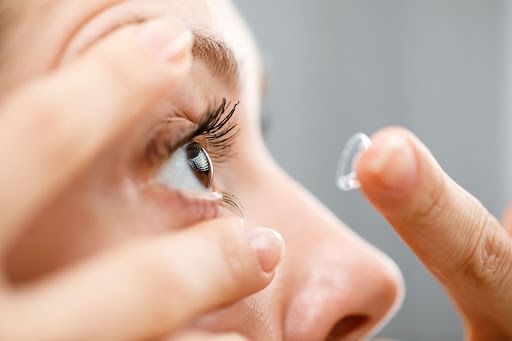Eye Care
The Dangers of Improper Use of Contact Lenses: Protecting Your Vision and Eye Health

by admin
26th September 2023
8 minutes read
Introduction
Contact lenses have revolutionized the way people with vision impairments correct their sight. They provide a more convenient and aesthetically pleasing alternative to traditional eyeglasses. However, the improper use of contact lenses can lead to serious consequences that affect not only your eye health but also your overall well-being. In this blog, we will explore the potential risks and dangers associated with improper contact lens usage and provide essential tips to ensure the safe and effective use of these vision correction devices.
Understanding Contact Lenses
Contact lenses are thin, curved discs made from various materials that sit directly on the surface of the eye’s cornea. They correct refractive errors like myopia (nearsightedness), hyperopia (farsightedness), astigmatism, and presbyopia. Contact lenses offer several advantages, such as a wider field of view, no fogging, and the ability to engage in various sports and activities without the restriction of glasses. However, they require meticulous care and proper handling to avoid complications.
Common Improper Use of Contact Lenses
Extended Wear Beyond Recommended Periods: Some contact lenses are designed for extended wear, allowing users to keep them in overnight or for several days. However, even these lenses have their limits. Wearing contact lenses beyond the recommended duration can lead to oxygen deprivation to the cornea, causing discomfort, redness, and a higher risk of eye infections.
Incorrect Cleaning and Disinfection: Failure to follow proper cleaning and disinfection procedures is a major source of eye infections. Using tap water, saliva, or homemade solutions to clean lenses can introduce harmful microorganisms and lead to serious eye conditions like bacterial keratitis.
Failure to Replace Lenses Regularly: Contact lenses have an expiration date. Ignoring this date and using lenses beyond their intended lifespan can cause reduced oxygen permeability, lens deposits, and an increased likelihood of eye infections and irritation.
Swimming or Showering with Contacts: Contact lenses should never come into contact with water, especially in swimming pools, hot tubs, and showers. Water can harbor dangerous microorganisms, leading to severe eye infections and corneal damage.
Sharing Contact Lenses: Sharing contact lenses with friends or family members is never a good idea. Each person’s eyes have unique characteristics, and using someone else’s lenses increases the risk of transferring harmful bacteria, viruses, or other contaminants.
Sleeping with Contact Lenses: Unless specifically designed for extended wear, sleeping with contact lenses is strongly discouraged. During sleep, tear production decreases, reducing the amount of oxygen reaching the cornea and increasing the chances of infections and corneal swelling.
Potential Risks and Complications
Eye Infections: Improper use of contact lenses can lead to bacterial, fungal, or viral infections, such as conjunctivitis, keratitis, and corneal ulcers. These infections can cause pain, redness, sensitivity to light, and, in severe cases, vision loss.
Corneal Hypoxia: Extended wear or failing to remove contact lenses during sleep can lead to corneal hypoxia, a condition where the cornea doesn’t receive enough oxygen. This can result in corneal swelling, blurred vision, and discomfort.
Corneal Abrasions: Incorrect handling and fitting of contact lenses can cause corneal abrasions, which are scratches on the cornea’s surface. This can lead to pain, sensitivity, and increased risk of infection.
Giant Papillary Conjunctivitis (GPC): GPC is an allergic reaction caused by protein deposits on the contact lenses or poor lens hygiene. It leads to itching, redness, and mucus discharge from the eyes.
Dry Eye Syndrome: Contact lenses can exacerbate dry eye symptoms. Improper lens care and extended wear can further deplete tear film, leading to discomfort, irritation, and even corneal damage.
Vision Impairment: Failing to adhere to proper lens replacement schedules can result in blurry vision, ghosting, or distorted images due to lens deterioration and deposits.
Essential Tips for Safe Contact Lens Usage
Consult an Eye Care Professional: Before using contact lenses, visit an eye care professional for a comprehensive eye exam and fitting. They will help determine the right type and prescription of contact lenses suited to your eyes.
Follow Proper Hygiene: Always wash your hands with soap and water before handling contact lenses. Avoid using lotions, creams, or perfumes on your hands, as these can transfer to the lenses.
Strictly Adhere to Replacement Schedules: Replace your contact lenses as recommended by your eye care professional and the lens manufacturer. Never wear expired lenses.
Use Recommended Cleaning Solutions: Clean and disinfect your contact lenses using the solutions recommended by your eye care professional. Avoid homemade or improvised solutions.
Remove Lenses before Sleeping: Unless explicitly prescribed for extended wear, always remove your contact lenses before sleeping.
Avoid Water Contact: Keep your contact lenses away from water, and never swim or shower with them on.
Don’t Share Lenses: Never lend or borrow contact lenses. Each individual should have their own, properly fitted pair.
Regular Eye Exams: Schedule regular eye exams to monitor the health of your eyes and ensure your contact lenses are fitting correctly.
Conclusion
Contact lenses offer unmatched convenience and visual freedom, but their improper use can have serious consequences for your eye health. By following the essential tips outlined in this blog and maintaining good hygiene and lens care practices, you can enjoy the benefits of contact lenses while safeguarding your precious vision. Remember that your eye health is not something to be taken lightly, and consulting an eye care professional should always be a priority when it comes to your vision correction needs.
How Can Medfin Help?
Medfin is a daycare surgery expert providing access to the latest surgical procedures and top doctors in your city at affordable prices. Medfin provides you access to top doctors and surgeons with 10+ years of experience . With Medfin, you can leave your hassles behind and focus on your health. From instant consultations to paperwork assistance, we have got you covered with everything. So why wait? Call us today!
FAQs
1. What are the steps for inserting contact lenses properly?
Inserting contact lenses correctly is crucial to ensure comfort and clear vision.
- Wash your hands thoroughly with soap and water, then dry them with a lint-free towel.
- Avoid using products like lotions or creams on your hands before handling lenses.
- Place the lens on the tip of your index finger, making sure it is not inside out (the edges should flare slightly upward).
- Use your free hand’s fingers to hold your upper and lower eyelids open gently. Look straight ahead, and gently place the lens onto your eye’s cornea.
- Blink a few times to help the lens settle into position.
2. How often should I replace my contact lenses?
The frequency of lens replacement depends on the type of lenses you are using. Daily disposable lenses should be discarded after a single day of use, while bi-weekly, monthly, or extended wear lenses have specific replacement schedules. Follow your eye care professional’s recommendations and the manufacturer’s guidelines. Never wear lenses beyond their intended lifespan, as this can lead to discomfort, vision problems, and an increased risk of eye infections.
3. Can I sleep with my contact lenses on?
Unless specifically prescribed for extended wear, sleeping with contact lenses is not recommended. Sleeping with lenses reduces the oxygen supply to the cornea, leading to corneal swelling and an increased risk of infections. Always remove your lenses before bedtime, and give your eyes a chance to rest and breathe.
4. How should I clean and store my contact lenses?
Proper lens care is vital for maintaining eye health. Clean and disinfect your lenses regularly using the solutions recommended by your eye care professional. Rub and rinse the lenses with the solution to remove debris and deposits. Store them in a clean, dry case, and replace the case every three months. Avoid using tap water, saliva, or homemade solutions, as they can lead to eye infections.
5. Can I wear my contact lenses while swimming?
No, you should never wear contact lenses while swimming or in any water-related activities. Water, whether in swimming pools, lakes, or showers, can harbor harmful microorganisms that can adhere to the lenses and cause severe eye infections. Remove your contact lenses before swimming and wear prescription goggles instead.
6. Can I share my contact lenses with others?
Sharing contact lenses is a dangerous practice and should be avoided at all costs. Each person’s eyes have unique shapes, sizes, and prescription needs. Using someone else’s contact lenses can lead to improper fit, discomfort, and an increased risk of eye infections. Always use contact lenses prescribed specifically for your eyes and never lend or borrow them from others.
CATEGORIES
- ACL Reconstruction
- Anal Fissures
- Anal Fistula
- Appendicitis
- ASK A DOCTOR
- Benign Prostatic Hyperplasia
- Breast Lump Excision
- Cataract
- Circumcision
- Conditions & Diseases
- Cosmetology
- Covid-19
- Cure
- Endocrinology
- ENGLISH VIDEOS
- Eye Care
- Gallstones
- General Surgeries
- Government Schemes
- Gynaecology
- Gynecomastia
- Health
- Health Insurance
- Hernia
- hindi
- Hip Arthoscopy
- Hip Replacement
- Hip Replacement Surgery
- Hydrocele
- Kannada
- Kidney Stones
- Knee Arthroscopic
- Laparoscopic
- LASER
- Latest Treatments
- Lifestyle
- Liposuction
- Medfin Stories
- Medicine
- Nephrology
- Ophthalmology
- Orthopaedic
- Paraphimosis
- Patient Testimonials
- PCL Reconstruction
- Phimosis
- Piles (Hemorrhoids)
- Pilonidal Sinus
- Proctology
- Prostate Artery Embolization
- Rhinoplasty
- Second Opinion
- Total Knee Replacement
- Uncategorised
- Urology
- uterine artery embolization
- Uterine Fibroids
- Varicocele
- Varicose Veins
- Vascular
- VIDEOS






